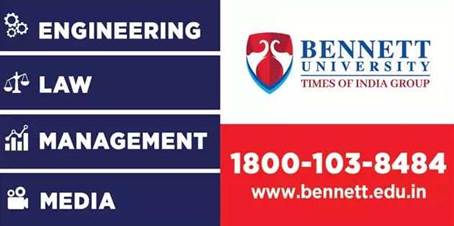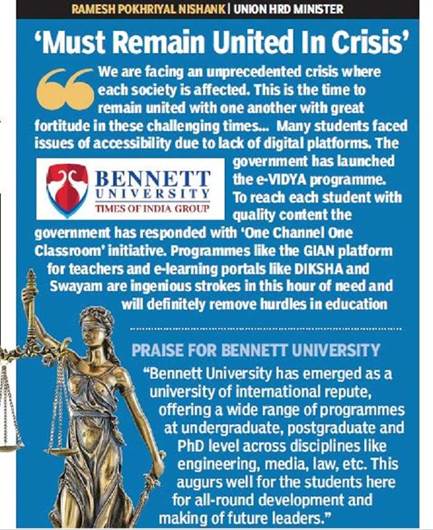|
Author: TNN
Publication: The Times of India
Date: June 13, 2020
URL: https://timesofindia.indiatimes.com/india/cant-compare-covid-crisis-with-emergency-era/articleshow/76351288.cms
The Supreme Court’s handling of the Covid-19 crisis can’t be compared with its role during the Emergency, former Chief Justice of India Ranjan Gogoi said. Late last month, 20 senior advocates had accused the SC of exhibiting Emergency-type mindset, by not intervening in time and preventing the migrant crisis from unfolding.
“The role of the judiciary in a crisis situation is of a course corrector and as an evaluator with constitutional ethos as the guiding norms… Attributing ill will to the institution as a whole or individual judges only serves to adversely weaken the institution,” Gogoi said during his special address at the ‘Covid-19: Constitution and Legal Challenges’ webinar organised by Bennett University.
“Its (SC’s) silence or failure to act has been compared to the role of the institution during the Emergency. In my view, the two situations are not comparable. What happened during the Emergency are constitutional perversions conceived by the human mind. Though legal options were clearly available to undo the wrong, we humans faltered. The current situation is beyond human comprehension. Never before have we experienced anything even remotely similar. The scenario offers only hindsight views.”
But he felt well-founded criticism of judicial performance is indeed crucial for the vitality of an institution. However, though “hyperboles masquerading as honest criticism may benefit a few in the short run, in the long run it would for sure adversely affect the nation as a whole.”
“There are limits to judicial power exercised by courts, in particular the SC… The court has the mandate to protect basic rights and uphold the Constitution but it is also bestowed with a wisdom to step back from what are essentially problems of administrative nature, requiring consultations.”
“The court, therefore, ought not to act as the first recourse to settle all stresses and strains, that is, even before the executive and the administration have had the opportunity to address such concerns.” So, “while unprecedented times may call for unprecedented responses”, the duty of the court is also to constantly try and work with the administration to tackle the fallout of crisis situations without compromising basic rights and liberties of citizens.
‘Reforms must to handle fallout’
Reform processes are “absolutely” required to deal with the impact of the Covid-19 crisis on lives and economy, noted lawyer and former solicitor general Gopal Subramanium stressed during the webinar, speaking on the legal landscape for corporate finance in recoupment phase.
“Reform processes are absolutely required and it needs government initiative like adequate investment in infrastructure, institutions, governance, education and health. There should be public spending and public-private partnership in these sectors,” he said. Terming the Insolvency and Bankruptcy Code a game-changer for converting non-performing assets into performing assets, Subramanium said there is a need to amend the law to make it more effective and speedy. He suggested that cases under the code be decided by a three-member panel, comprising one judicial, and two domain, experts.

‘Virtual hearings must continue even after the reopening of courts’
Welcoming the temporary shift to virtual hearings, former attorney general of India, Mukul Rohatgi, said they should be integrated with physical functioning of courts after reopening.
Since the lockdown, there has been no more rushing to courts, jostling with lawyers and wearing gowns. “In a matter of two months, all that seems to be in the distant past,” Rohatgi said. “This system must remain even if we bring the physical system back... Maybe reserve one day for hearings conducted through video conferencing.”
Sharing his experience of appearing in court remotely, Rohatgi said virtual hearings have a number of benefits. “Judges are sitting in homes, may not have access to all law books. One has to be to the point. This is a better, cheaper and more integrated system, it is also good for the environment.”
He added lawyers from mofussil towns can appear in court from remote locations. “Litigation has become cheaper because lawyers need not travel,” he said.
Drawing a comparison to the lockdown resulting in a cleaner Ganga, Rohatgi said a similar cleanup of the judicial system could follow. “What 15 years of government intervention couldn’t do, the lockdown has done: Ganga has healed itself. Similarly, what 10 years of connecting courts by e-system, by different committees and paperwork couldn’t do, has been done in eight weeks because necessity is the mother of invention,” he said.

‘Need law to deal with lockdown defaults’
The lockdown imposed by the government to check the Covid-19 pandemic could lead to many complex legal disputes arising out of non-performance of contractual and statutory obligations by people, companies and authorities. And the Centre should bring a law to deal with the issue, constitutional expert and senior advocate Harish Salve said.
Such a law is the need of the hour as the scenario triggered by the pandemic is very complex and the government should take the initiative to bring a legislation instead of leaving it to the judiciary to decide as the courts are already overburdened with cases.
On the impact of Covid-19 on contracts and commerce, he said many countries across the world are considering framing a Covid-specific law to deal with the crisis, which has thrown up challenges of a new kind never witnessed earlier.
Salve said the government can pass an order not to take any coercive action but what will happen in cases of third-party duty? “There is need for a law so that people are not penalised because of non-performance of contractual obligations as whole businesses were shut and there was no fund during the period.”
He said the government has the responsibility to mitigate hardships caused to businesses, service providers, etc., as lockdown affected the performance of contracts and statutory duties. “Lockdown has disrupted the performance of these statutory duties, including filing tax returns, reporting to regulators, etc. The government has granted remissions, relaxations, but that is only a small part of the existing problem. There is a gap and some law is needed to ensure people are not unnecessarily penalised for nonperformance of such duties.”
‘Cooperation of centre, states key in virus fight’
A strong federal structure is extremely important in dealing with a pandemic successfully, and cooperation between Centre and the states is key to mitigating the crisis, former Chief Justice of India P Sathasivam said at the webinar.
Addressing the valedictory session on the legal and constitutional challenges during coronavirus, Justice Sathasivam began by reminding the audience of the Preamble and the Constitution. “We have to remember our Preamble and our Constitution, which is very relevant for our discussion. Apart from justice, it is also important to remember fraternity. Fraternity ensures the dignity of the individual and unity and integrity of the nation... and it applies to all citizens, irrespective of their religion, place of birth,” he said.
Justice Sathasivam, who said that “cooperation between the Centre and states is very important” and that “cooperative federalism is paramount”, listed four key issues during the lockdown period: “Declaration of nationwide lockdown without consultation of the states, irregular supply of medical equipment, fate of migrant workers, and tackling of some opposition-ruled states.”
While discussing the operation of constitutional law in inter-state relations during a pandemic, Justice Sathasivam, also a former governor of Kerala, pointed to the need to amend decades-old labour laws. “The Centre is planning to redefine migrant workers to ease sharing of information, which is essential for proper food distribution and other welfare schemes,” he said.
Nobody can dispute that the Centre, on request from the states, organised Shramik trains for migrant workers, he said, adding that, “however, lack of coordination between the Union government and states is the main issue”.
“It is also to be mentioned that during their transportation they (migrants) failed to follow social distancing norms. The reason that these things happened is because of improper assistance or not much cooperation among the states and (Centre),” said the former CJI.
|